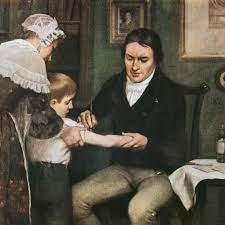One thing everyone seemingly can agree on is that Pfizer, Moderna, Johnson & Johnson, and other pharmaceutical companies developed their Covid-19 vaccines in world-record time. Less than a year passed from the outbreak of the virus in January 2020 until a British woman received the first dose in December 2020. (And they could have been available to willing individuals sooner had regulatory agencies not stood in the way.)
But while the Covid-19 vaccine was developed by big companies in expensive laboratories, it’s worth remembering that many of humanity’s great achievements came from individuals on shoestring budgets. Apple computers were born in Steve Jobs’ garage, for example. George Washington Carver came up with 105 recipes using peanuts — a nutritious, easy-to-store, and relatively cheap food — largely on his own. And yes, “on his own,” is how Edward Jenner invented vaccines.
Acting on an educated guess but little to no hard data — and certainly no peer-reviewed studies — Jenner, a country doctor from Gloucestershire, England, in May of 1796 scratched fluid from a cowpox blister into the skin of an eight-year-old boy. Jenner believed this tactic would protect the boy from smallpox, the world’s deadliest disease at the time. Sure enough, six weeks later, when the doctor inoculated the boy with smallpox itself, no infection resulted. The boy was vaccinated (a term that comes from the Latin word for cow: vacca.)
The rest — the polio vaccine, the measles vaccine, the tetanus vaccine — is history. All were based on Jenner’s world-changing technique.
But consider where we’d be if Jenner had needed to fight through miles of regulatory red tape to earn approval to conduct his experiment on — again — an eight-year-old boy. Instead, he was empowered to take the cow by the tail and just … do it.
No doubt, the results could have been disastrous. His unproven, untested idea could have killed the young subject of his experiment. And no doubt, the history of scientific experimentation is littered with radical studies conducted unethically (though an astute observer might point out that the worst ones tend to have been orchestrated by government agencies like the CIA or the US Public Health Service Commissioned Corps).
But if there’s one overarching truth the great Austrian economists have demonstrated, it’s that there are no magic bullets — no easy solutions to difficult problems. There are only tradeoffs; in Jenner’s case, great risk (his reputation, freedom, and general ability to sleep at night) for great reward (a reputation as The Father of the Vaccine and savior of millions of lives).
And because humans are so different and diverse, and because we each have different collections of experiences and knowledge to draw on, no government or centralized authority is fit to infringe on our risk-reward ratios, as they so often do by imposing restrictions on what people can or cannot put in their bodies or what kinds of studies are allowable.


